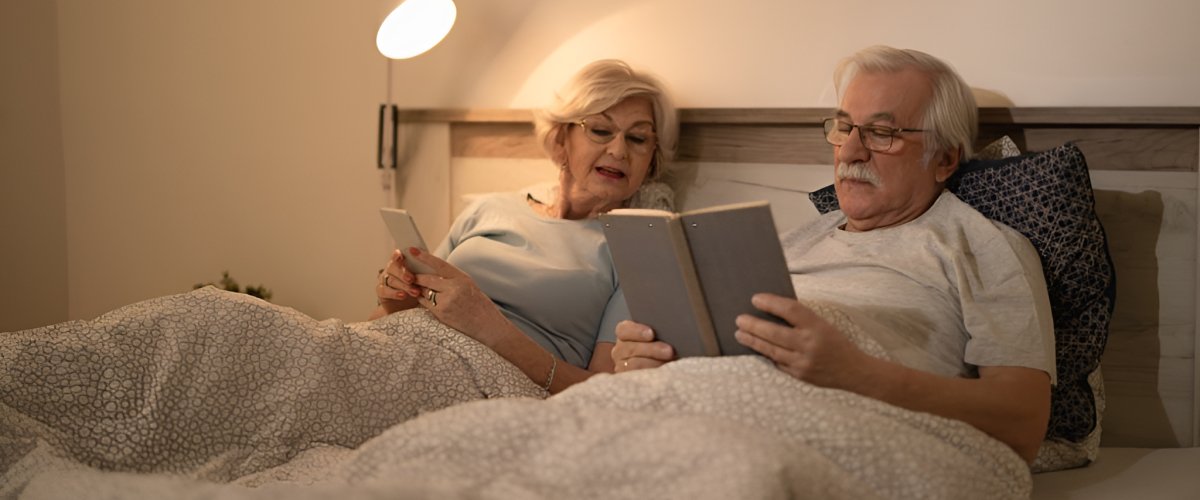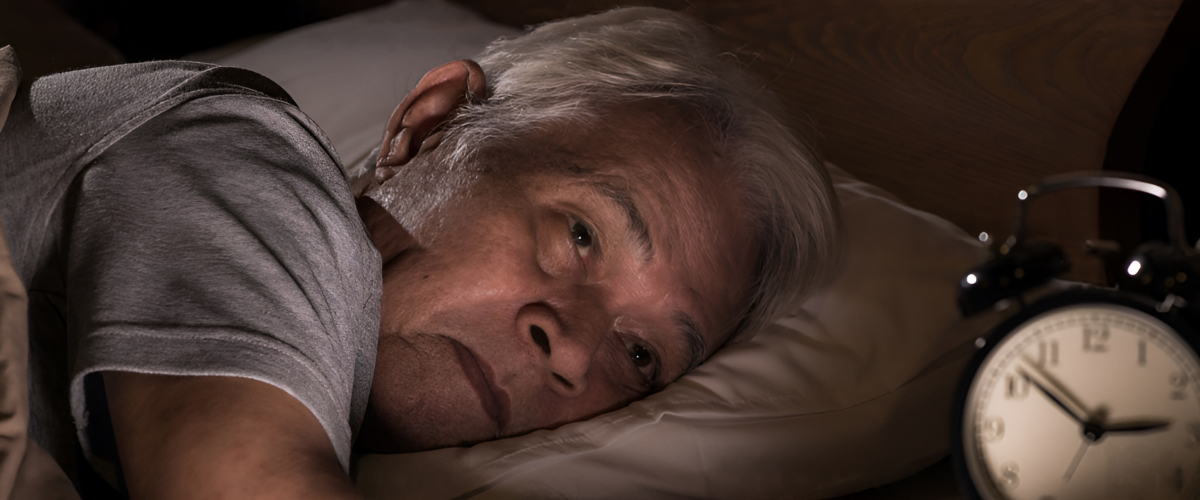Long-term unhealthy sleeping patterns can take a toll on senior’s health and cause serious health risks. In this article, we’ll dive into the health dangers of disturbed sleep among the elderly and how you can create a relaxing bedtime routine for seniors.
Common Causes of Sleeplessness Among the Elderly:
In most cases, the changing sleep pattern among seniors is not something to be concerned about. However, if it persists and starts reflecting poor health, it is important to find the root cause of this. Restless nights among the elderly can be tiresome for those around them as well. Some of the causes of poor sleep include:
- Medical Conditions or Pain
- Lack of Exercise
- Poor Sleeping Habits or Environment
- Medications
- Stress
- Lack of Sunlight
- Sleep Disorders
10 Steps to Create a Relaxing Bedtime Routine for Seniors:
A bedtime routine is a comforting series of things you do regularly, usually in the 30 to 60 minutes before you go to sleep. This helps you relax and get ready for a good night’s rest. In order to create a healthy lifestyle, a relaxing sleep is highly important.
Here are some ways you can create a calming bedtime routine for your aged loved ones:
1. Set a Reminder to Start The Bedtime Routine:
An alarm set at the same time every night could help remind the seniors to start prepping for their bedtime routine. At home, senior caregivers should ensure that the senior sticks to one dedicated wake-up time and sleep time. The practice of following a consistent time should be followed during the weekends as well. Remember, consistency is the key!
2. Create a Music Playlist From Your Favourite Artists:
Studies have shown that listening to soft and soothing music before sleep helps calm down the nerves and reduce anxiety. The senior should not feel obligated to listen to any specific music genre. It may be classical, jazz, or simply ambient sounds like pink noise or white noise, as long as it helps them release stress and bring a relaxing sleep.
Pink noise refers to soft sounds like rain, wind, or waves while white noise is the sound that mutes the surrounding loud sounds.
Read More: 10 Health Benefits of Music Therapy for Seniors with Dementia
3. Avoid Heavy and Unhealthy Foods Before Bed:
Intake of heavy foods or alcoholic beverages before bed could disrupt the night sleep as it may cause indigestion, and acidity, and can also lead to weight gain. Consequently, sleeping on an empty stomach is just as dangerous as sleeping on a heavy one. If late-night cravings hit, the senior may have a light snack such as fruits like kiwi, cherries, or grapes. Furthermore, yogurt, rice, and nuts have also proven to be sleep-inducing.
Caffeine steals away sleep due to its ‘alerting’ nature of effect. Convince your elderly loved ones not to consume any beverages containing caffeine like coffee at least before bed. Moreover, drinking fewer liquids in general can save the bathroom trips in the middle of the night and hence, help bring a peaceful sleep.
Read More: 11 Healthy Eating Tips for Seniors to Get the Nutrients They Need
4. Soak Your Stress in a Warm Bath or Cold Shower:
The night often gives more time for a prolonged relaxed bath rather than the rushy day showers. Taking a bath before bed washes away the stress of the whole day and reduces the body temperature as well. Including this activity in the bedtime routine for seniors encourages a calm and peaceful sleep.

5. Books Are Your Best Friends:
If your loved one is fond of books, encourage a habit of bedtime reading with them. If they loved reading books before going to bed as a child, chances are it would still bring them happiness. However, it is important to keep them away from exciting or sad genres of books. Rather, it will be helpful if the book is light-hearted and has a simple plot. It will calm their nerves down and induce a relaxed sleep.
6. Exercise to Calm the Mind and the Muscles:
Adding a simple but regular workout such as yoga or deep breathing exercises in the senior’s bedtime routine could guarantee a comfortable sleep. If they simply stretch before bed, it could relax their muscles and save them from cramping. If physical exercise is not possible, try incorporating meditation into the routine of your loved one. Have them close their eyes and focus on their thoughts for a while. This could help calm the mind and release stress.
Read More: Best Mobility Exercises for Seniors
7. Journal to Release the Negative Emotions:
Journaling is the best way to address the deep hidden unexpressed emotions which affect mental and emotional health in one way or another. Writing down the simplest of emotions could help you in ways more than you can imagine. It is one of the best ways to lighten the heart before sleeping.
8. Put Away All Electronic Devices:
It is highly essential that all electronic devices including mobile phones, TV, and other gadgets are kept away from the elderly at least 30 to 45 minutes before bedtime. The blue light emitted from the screens can keep you active for long hours and bring sleeplessness. No matter how enjoyable these devices may be, they are highly addictive and can cause disruptions in sleep. Therefore, remember to turn them off before going to bed for a relaxed sleep.
9. Lower the Thermostat and Dim the Lights:
The atmosphere you provide your elderly parents while sleeping plays a huge role in their sleep. A warm temperature of 65 Degrees Fahrenheit is ideal to bring the body to its relaxed state. Moreover, the body gets a signal to drown into drowsiness when the lights are turned down low. The dark and cozy atmosphere helps the body relax and encourages healthy sleep.
Read more on: Benefits of Adjustable Beds for Seniors: Improved Sleep Quality and Comfort
10. End the Day by Drinking Something Warm:
Most seniors like to indulge in drinking warm beverages before bed. Chamomile tea is an excellent option in this regard as it is caffeine-free. Warm milk is another good option to drink before bed. These drinks help in getting a good night’s sleep.
Importance of a Good Night’s Sleep:
A healthy sleep cycle does not only provide physical health benefits but helps one wake up with a rejuvenated mind. It impacts the emotional well-being of seniors and makes their immune systems strong as well. While the hours may vary for each person, most seniors require at least seven to nine hours of night’s sleep. A well-rested sleep caters to a healthy mind and body.
Keep in check the senior’s stress levels during the day as it can interfere with sleep at night. Find out what activities interest them and keep their worries at bay. Engage in meaningful heartfelt conversations if they please. Try implementing the above-stated variety of activities in your elderly parent’s bedtime routine to help them achieve a good night’s sleep.
Effects of Aging on Sleep:
At any age, unhealthy sleeping patterns cause deterioration in physical and mental health. Maintaining a good sleep pattern is crucial, especially among the elderly. As your loved ones grow older, their body produces a lesser amount of growth hormones which reduces their chance to delve into a deep sleep. This causes the body to produce lower levels of melatonin and hence, causes a person to wake up more often during the night.
Conclusion:
Crafting a bedtime routine for seniors requires compassion, patience, and understanding. As aging brings changes, a calming bedtime routine with gentle activities can enhance their quality of life. A soothing sleep environment and meaningful connections like heartfelt conversations can offer them the emotional comfort they need. Hence, a calming bedtime routine for seniors can help them experience a peaceful and relaxed sleep.
Want to learn more?
ConsidraCare’s live in caregiver are experienced professionals who know how to preserve senior independence. Please reach out to us at wecare@considracare.com, or call us at 1-855-410-7971, and we will be happy to help you arrange care for a loved one.
FAQ’s:
1. What is the best way for seniors to sleep?
The best position for seniors to sleep is to align their hips pelvis and spine. Moreover, they should avoid sleeping on their stomach as it causes pressure on the nerves in the neck.
2. What is the 10-3-2-1-0 rule for sleep?
10 hours before bed: No more caffeine. 3 hours before bed: No more food or alcohol. 2 hours before bed: No more work. 1 hour before bed: No more screen time.
3. What time should a senior go to bed?
While the time may vary depending on the person, the ideal time for seniors to go to bed is around 8 p.m. and wake up around 4 a.m.
4. How do you treat insomnia in seniors?
Daily exercise, healthy dietary habits, reduced caffeine intake and maintaining consistency in sleep schedule can help treat insomnia among seniors.
Read More: 7 Effective Natural Remedies to Treat Insomnia in Elderly
5. What causes elderly to not sleep?
Apart from caffeine, alcohol, and medications, sleep disorders like Restless Legs Syndrome (RLS), and periodic limb movement disorder can cause sleep disruptions in seniors.
Maryam is a leading writer at ConsidraCare, specializing in senior care. Her well-researched articles are widely recognized for guiding families through the complexities of caring for loved ones, establishing her as a trusted and authoritative voice in the field.

